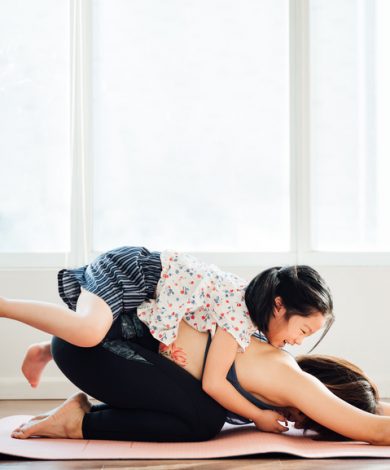When I became a doula, it was important to me to support women in the…
Mindset
What Labor & Delivery Care Should Look Like: Holistic, Supportive, and with 9 Key Health Practitioners
August 23, 2021 • By Alissa Alter

We think about a lot of things going into childbirth.
We pick out a going-home outfit for the baby. We pack super soft pajamas for ourselves. Chapstick. A cell phone charger with a super long cord. Some people make a playlist to help inspire and pump them up while they’re pushing.
But there’s something we don’t often think about enough, and that’s who will be with us in the room while we are giving birth and immediately after. Of course, there are assumptions made. You probably want your partner and maybe your mom, right? A doula? A friend?
But the truth is, we usually only think about it halfway. We need to shift our mindset and deeply consider who is in that room with us and why they are there. What support do we truly need? It’s probably not hair and makeup for the hospital photographer, but more along the lines of our own baby nurse/nanny/babysitter whose sole purpose is caring for us. Fully.
In my ideal world, the following people are in the room where it happens to support the living daylights out of me and my husband every step of the way.
An OBGYN in case we need a surgical intervention or repair. I love a specialist who is highly skilled at repairing anal sphincters (yes, I understand this one may be particular to me only).
A midwife to guide labor and delivery and make sure mama and baby are safe and things are progressing as they should. Who suggests alternative birthing positions that are appropriate for the mama and baby in front of her.
A doula to mother the mother. To talk her through what is happening and what to expect. Holding her hand. Massaging her. Using counter pressure to ease the intensity of contractions. Essential oils. Words of affirmation. The works.
A massage therapist to massage her the entire time. Maybe two so it’s like a four handed massage and sometimes six handed with the doula. Promoting circulation, helping fluid move through her body, relieving muscle tension so mama can push as long as she needs to, calming the nervous system to support mental health and clarity. Creating a space where mama feels revered, cherished, and celebrated.
A psychiatrist to see what is actually happening and be able to support the mother (and partner) postpartum with medication if needed if postpartum depression or anxiety show up. Or if the birth is traumatic and mama is at risk for PTSD or other mood disorders as a result of the birth.
A therapist to unpack the birth story with mama. Go over everything that happened and what it felt like. What it brought up for mama. And guide her through this process as she also handles finding her footing, her grounding, her identity as a new mother.
A physical therapist to help rehabilitate the pelvic floor (which needs some TLC after a vaginal or belly birth) and abdominals from pregnancy and/or birth. The lower back which has been immobile for months. Your shoulders from holding and feeding your baby. Your neck from looking down at your baby and/or phone all the time. And to give guidance on how to continue moving her body safely as she recovers.
A nutritionist/chef who can make you food that supports your recovery based on how much blood you lost, repairing any muscle tears or cuts, milk production if you are moving toward that, your mental health, and everything else.
A reiki practitioner to help realign your energy and spirit and connect you to yourself and your life.
Your partner with whom you are creating this family.
Your loved ones. Your ride or die people who support you no matter what. That you can cry with and celebrate with and it feels like you are doing this together.
I could keep going.
In an ideal world, labor, delivery, and postpartum care would be holistic. Considering each birthing person as the entire, multi dimensional human beings we are. And actually taking care of us accordingly.
But that’s not how our system works here in America.
Each practitioner is trained in their specialty. Sure, when they start medical school they are exposed to a little bit of everything while rounding in hospitals and then they choose their specialty from there. Then that is what they learn. Their speciality. And only their specialty.
You don’t want your Opthamologist doing your Pap Smear, right? But we do want our OBGYN to support our mental health. And I think a lot of them want to do that too! But they aren’t trained to. And in their training everything is kept so separate that it’s not easily accessible to get the knowledge we as patients need them to have.
So they refer us out. If we ask. And this is where, for me at least, it gets sticky. Because I thought I could “handle” my Postpartum Anxiety and PTSD. In reality, I was drowning. I needed my doctor to make the call. I needed someone to throw me a life preserver.
And I’ve gone back and forth being angry at my OBGYN who I know took the best care of me that she could. And she did. She repaired my 4th degree tear seamlessly. I had a smooth recovery (relatively speaking) and have no complications or continuing symptoms or side effects. She is brilliant and what she does. At what she does.
I say all of this because there isn’t a lot of clarity in what we can expect from our providers. So I know I fall into the category of expecting them to know everything. They’re doctors! But I don’t think that’s fair to them. They, as individual human beings, are dedicated to their careers, take pride in their work, and do the best they can every day.
The medical system isn’t supporting them either. I’m not making excuses either. As I said, I still wrestle with my feelings and my anger and trauma. And this is why I believe it is beyond important, it’s imperative, crucial, essential that we advocate for ourselves.
When we ask every single question. Even if it feels “dumb.” That we go into our appointments and show our doctors and practitioners what we want and need. That we teach them what mothers actually need. Because it’s not a “you’re all clear. Don’t let the door hit you on the way out” at your six week appointment.
It’s not accepting “that’s normal” as the answer to every single question you have. It’s not that antiquated checklist that screens for depression and anxiety.
We want, need, and deserve more. That’s why this article exists, why this platform exists, why we’re here shining a light on these issues. We want to create change. And we want you to be a part of it too.



